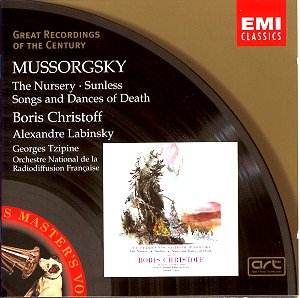This disc shows Boris Christoff at his very best; the
repertoire is perfect for him, the voice is sonorously magnificent,
and the insight he brings to the texts is unrivalled. Keen readers and
enthusiasts will already know of the provenance for this latest release.
All the items are culled from a famous 1958 three disc box that was,
as far as I am aware, the first serious attempt to record the complete
songs of Mussorgsky. EMI have put together the most famous of the songs
from that original set, giving us a very well filled representation
of both the composer and the artist.
It is fair to say that Mussorgsky was the composer
who meant most to Christoff. As John Steane’s informative note tells
us, Christoff was actually studying law when he discovered the composer,
and he duly redirected the whole course of his life ‘out of profound
admiration for the genius of Modest Mussorgsky’. His Boris is one of
the best on disc (and is also in EMI’s GROC series), and these song
recordings consolidated his already world-wide reputation. The best
known and most frequently recorded of the short cycles is undoubtedly
Songs and Dances of Death, profound meditations on the nature
of life and death. I prefer the intimacy of the original piano version,
where the startling originality of the settings comes through with amazing
force, but one can easily understand why a whole generation of Soviet
composers was drawn to orchestrating them. It is a pity Christoff did
not get around to recording the Shostakovich version (dating from 1962)
as it is, in my opinion, more faithful to the atmosphere of the original.
Still, there is much to admire in the Glazunov/Rimsky version recorded
here, particularly the rich (though surely inappropriate) bed of orchestral
texture supporting the voice. Hear how Mussorgsky sets the words ‘the
blizzard wails and howls’ (in Trepak, or Russian Dance),
where subtle understatement, rather than a more typical 19th
century romantic word painting, is the order of the day. These are interior
monologues that were way ahead of their time, and Christoff clearly
understood their significance. The anger and bleakness of The Field
Marshall is overwhelming, as dark and grotesque as anything in Mahler.
Christoff was occasionally accused of over-acting,
and the character of Mephistopheles seemed to bring this out in him,
whether in Gounod (also for EMI GROC), or here in the short Song
of the Flea a favourite encore with basses from Chaliapin onwards.
Christoff is delightfully over the top, hugely enjoyable and making
more straight-laced versions sound boring.
The Nursery is the other real highlight of the
disc. Christoff’s characterisation is simply amazing, the voice (as
in his multi-role singing in Boris) altered to an almost unrecognisable
degree. The poems here are Mussorgsky’s own, and beautifully capture
the abundant energy and playfulness of childhood, as well as its pain.
It is a real challenge to a bass singer, and Christoff shakes off the
years and lightens the voice to give us both the child and the nurse;
hear his naivety in the delightful The Beetle, where the child
recounts his adventures in the summerhouse.
The rest of the disc is equally enjoyable. I particularly
admired the piano playing of Christoff’s regular recital partner, Alexandre
Labinsky (also a skilled orchestrator, as the original box demonstrated),
which makes it all the more regrettable that the original version of
Songs and Dances was not included. Georges Tzipine’s conducting
is workmanlike rather than inspired, and the mono sound is amazingly
full and detailed, a tribute to EMI’s 1950s engineering. Full texts
and translations are included. A great recording of the century? Most
definitely!
Tony Haywood
